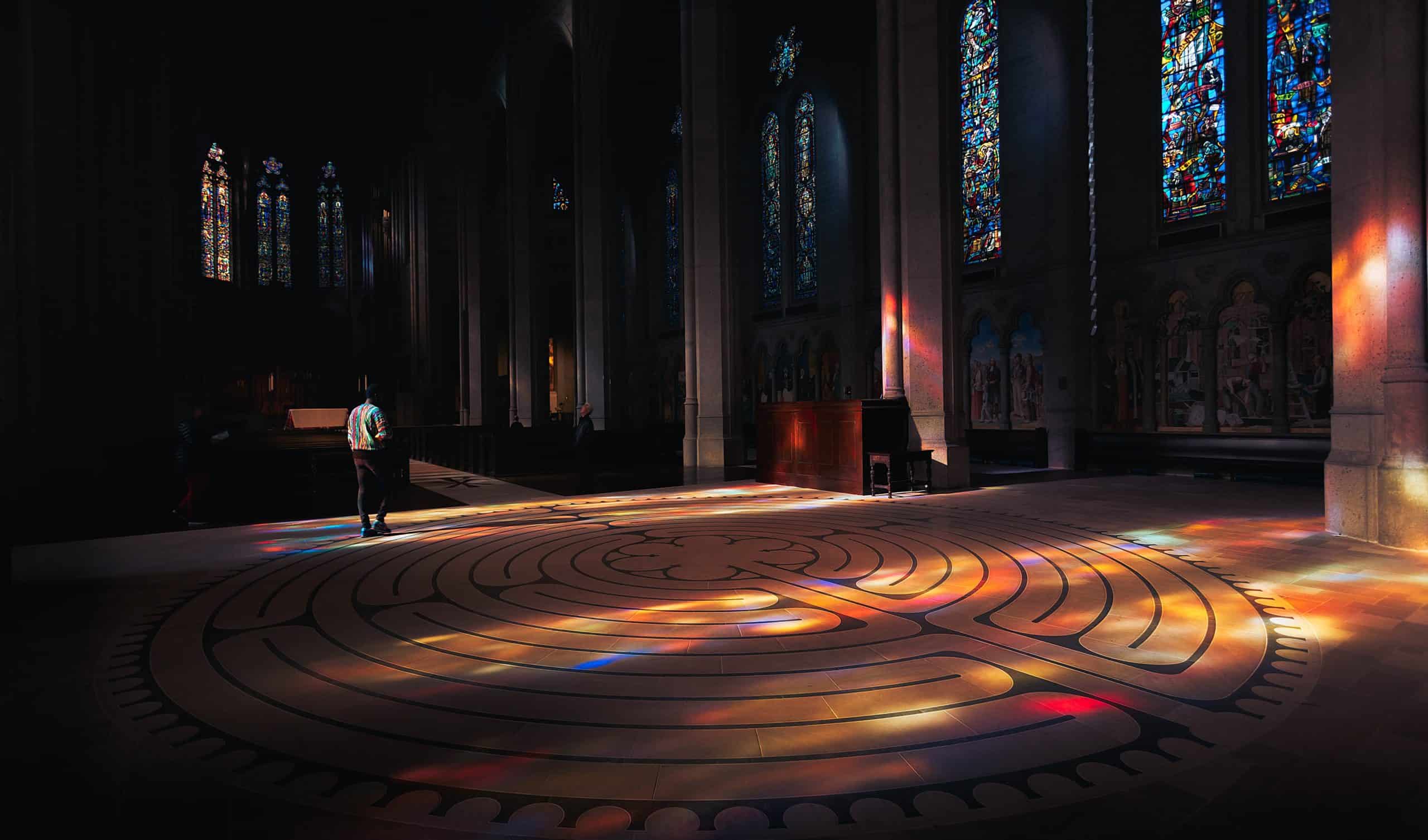This is the fifteenth installment of A Deacon’s Diary. In the fourteenth installment, Steve got ordained a priest!
I.
In the late afternoon, dimness and brightness play on the western windows of the church. The room is filled with a golden near-twilight and I’m glad I have the words of the rite memorized, so as not to have to read them. (Thanks to the professor who had us memorize them!)
I lean intently, close to the rough cloth panel as a penitent whispers her sins, trying to hear every word as the afternoon passes and the light fades into evening.
Several afternoons a week since ordination have been spent in the confessional. The parish is located close to downtown and next to a university, so it can get busy with lines of people waiting in the church basement outside the makeshift, pandemic-compliant confessional.
The penitent sobs invisibly behind the screen as I remind her of God’s love and mercy and offer a scripture passage to pray with as a penance.
And I recite the prayer for absolution, that brings God’s forgiveness and mercy into this moment and space:
God, the Father of mercies, through the death and resurrection of his Son has reconciled the world to himself and sent the Holy Spirit among us for the forgiveness of sins; through the ministry of the Church may God give you pardon and peace, and I absolve you from your sins …
The stranger leaves from behind the screen–a person I know both so much and so little about– and I get up to lock up. I pass through the lower church, checking if anyone is still praying; I pass by the washrooms; I put out the lights and the lower church and confessionals are heavy with gloom; I lock the outer door of the church and I unlock the gate to the upper church.
The power of the keys, I jest to myself as I ascend the stairs to the sun-filled upper church.
II.
In the short time I’d been a priest, I’d recited the words of absolution probably hundreds of times by now—I’d been hearing confessions since the Monday after ordination. Usually it was at the parish I was assigned to for the summer, sometimes I was a guest elsewhere. Once I heard confession in a bar in London.
The burdens were real, too. People came with all of their brokenness and wreckage of their lives and simply put it before me.
In the weeks since ordination, I hadn’t heard everything … yet. But I’d heard a lot of things. And even more so, I hadn’t yet received from God what priests describe as the “grace of forgetting.” Confessions haven’t quite left me yet–they rattle around in the back of my head, and I remember voices, faces, conversations often.
With some repetition, though, faces and voices are beginning to blur, but I can still feel everything that I’d heard. The weight. The sorrow. The despair. The contrition.
Bless me, Father, for I have sinned … many penitents begin, words no longer formally part of the rite.
Many penitents begin the same way, but all of them are different—individual souls with their own relationships with God, their own gifts, sins, lives. But all seeking much the same thing: forgiveness, mercy, love, and a second chance at (maybe) everything.
While I’ve been in the “box”:
I’ve heard about all kinds of abuse.
I’ve heard about use of pornography and masturbation.
About sexual affairs.
About missing Mass on Sunday and lukewarm prayer.
About gossip and hate and lies told.
About arguments and anger and failure to love.
About theft and drug use and addiction (which steals so much).
About dysfunctional families.
About failures in gratitude.
About struggles in life.
About loneliness.
About giving up.
About seeking good.
About seeking God.
And to all of it—even more than in this generic, sanitary list—I just sit and listen.
And if it seems good or helpful, I offer a word of encouragement or counsel.
I give a penance—often five Hail Marys for some particular intention.
The penitent makes an act of contrition and sometimes I ask them if they’re sorry for their sins, if I’m not sure.
And then without question, I speak the words of absolution. And tell them to go in peace. Almost always, I tell penitents that I’ll pray for them, which I do after I lock up.
III.
I have a routine at this point—partly to make sure everything gets locked or unlocked at the right time or that the right light switches are on. I wear the same stole – a skinny, plain, purple one without fringe that stays in the confessional, one of two. Its mate was made in France–the label tells me–and has gold bullion for fringe and is wide with large crosses.
Much is the same from afternoon to afternoon, except the penitents. Sometimes I wonder about certain “hard cases,” but I haven’t encountered any yet. A friend recently asked me if I would absolve a woman who had an abortion and he was happily surprised when I said that I would, without question.
With some very limited exceptions (“reserved cases” such as desecration of the Eucharist or attempting to assassinate the Pope) there is nothing that cannot be absolved. 1 God’s love and mercy are ready to redeem us from every imaginable–even every unthinkable–mistake.
I immerse myself in the flow of my routine and take comfort in the quickly-familiar words of the rite. Although some penitents have clearly had experiences of being rebuked or scolded by a priest, for me, there’s no question of not offering forgiveness and mercy. I routinely tell penitents how much God loves them and if they want something other than five Hail Marys, I assign a scripture passage that reflects that fact.
Lord, if I am too merciful, it is You who have taught me to be so, I pray as I kiss the neck of the stole and put it on over my clerical collar.
The allotted time goes quickly, one penitent after the next, each leaving unburdened.
IV.
My watch tells me that it’s time to lock up and no one seems to be waiting still. Some afternoons, the demand is so great, that I’ve stayed in the confessional forty-five minutes past “closing time.”
I hang up the purple stole on my side of the screen and unbutton my clerical collar.
The upper church is full of bright, multicolored blocks from the sun playing through the enormous stained-glass windows. At this time of day, the Ascension of Jesus is lit brightly and I take a seat on that side of the church, in view of the sanctuary and the tabernacle.
I set the timer on my watch for thirty-five minutes. (Otherwise I might miss dinner, I think.)
Some time for prayer had become part of my routine when hearing confessions—a priest friend offered it as a piece of advice when I’d commented that I found myself burdened when leaving the confessional.
I pray in silence for all of the penitents I’d met that afternoon—seen and unseen, but all of them heard by God in their seeking mercy.
-//-
Photo by Erez Attias on Unsplash.
- Sins confessed, even the very grave, can always be absolved. Some, however, have to be addressed by church authorities–the “reserved cases.” Until 2016, procuring an abortion was one of these in some regions. In 2016, Pope Francis granted permission for any and all priests to absolve this sin. In his letter, Misericordia et misera, that announced this change, he wrote: “I can and must state that there is no sin that God’s mercy cannot reach and wipe away when it finds a repentant heart seeking to be reconciled with the Father.” ↩


